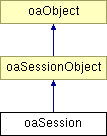 |
 |
 |
||||||
Inheritance diagram for oaSession:

 |
 |
Public Methods | |
| oaUInt8 | calcVMSize () const |
| void | minimizeVM () |
| oaCollection< oaAppDef, oaSession > | getAppDefs () |
| oaCollection< oaAppObjectDef, oaSession > | getAppObjectDefs () |
| oaCollection< oaConstraintParamDef, oaSession > | getConstraintParamDefs () const |
| oaCollection< oaConstraintDef, oaSession > | getConstraintDefs () const |
| oaCollection< oaDerivedLayerParamDef, oaSession > | getDerivedLayerParamDefs () const |
| oaCollection< oaDerivedLayerDef, oaSession > | getDerivedLayerDefs () const |
| oaCollection< oaGroupDef, oaSession > | getGroupDefs () const |
| oaCollection< oaConstraintGroupDef, oaSession > | getConstraintGroupDefs () const |
| void | setThreadUseModel (oaThreadUseModel useModelIn) |
| oaThreadUseModel | getThreadUseModel () const |
Static Public Methods | |
| oaSession * | get () |
A session database is automatically created and maintained as needed by the OpenAccess implementation. There is only one session database per OpenAccess session.
|
|
This function calculates and returns the amount of virtual memory that OpenAccess is currently using, including all open databases. |
|
|
This function returns the global session object. |
|
|
This function returns the collection of extensions that are currently defined. |
|
|
This function returns a collection of all oaAppObjectDefs currently defined. |
|
|
This function returns the collection of all currently defined constraint definitions. |
|
|
This function returns the collection of all currently defined constraint group definitions. |
|
|
This function returns the collection of constraint parameter definitions that are currently defined. |
|
|
This function returns the collection of all currently defined derived layer definitions. |
|
|
This function returns the collection of all currently defined derived layer parameter definitions. |
|
|
This function returns the collection of all currently defined group definitions. |
|
|
This function returns the current thread use model of the session. |
|
|
This function minimizes the amount of virtual memory currently used by OpenAccess. It releases memory OpenAccess is holding in reserve for future use, as well as dynamically allocated data structures that can be rebuilt as needed. Any libraries and databases that are in memory remain in memory, no objects are destroyed, and no object pointers are invalidated by this function. Applications can call this function in several scenarios:
In the first two cases, minimizeVM() should be called after purging the OpenAccess databases. In the third case minimizeVM() should be called between the different phases of processing. This function should be called sparingly, as it can have a substantial impact on the performance of subsequent operations. |
|
|
This function sets the thread use model for the session. The thread use model describes the way the application intends to interact with the database. By default applications are assumed to use the single threaded use model which corresponds to the OA22.04 behavior. This function does not create any threads. Changing the thread use model will alter the behavior of the database and it can significantly affect performance and capacity. Switching from a multi-threaded use model to a single threaded use model will not undo any of the data preconditioning that occurs when setting a multi-threaded use model. See the Thread Safety of the Programmer's Guide for details regarding the performance and capacity tradeoffs as well as the application's responsibilities when using OpenAccess in a multi-threaded way.
|

Copyright © 2002 - 2010 Cadence Design Systems, Inc.
All Rights Reserved.